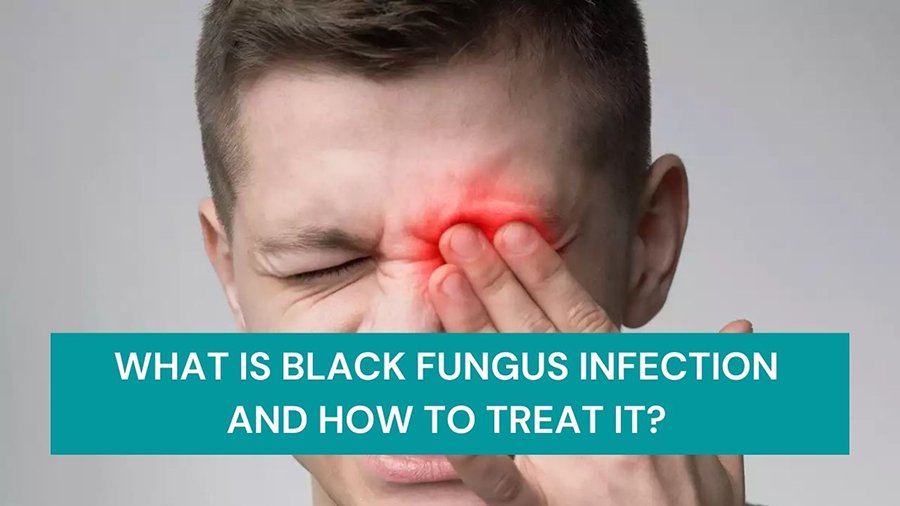The prevalence of fungal infections in India aren’t exactly rare, the precedence of cases has gone high in recent times. The infection seems to be most impactful for those suffering from severe coronavirus disease. Due to COVID outbreak, the risk of developing black fungus infection is becoming a concern.
What is Black Fungus Infection?
Mucormycosis is a disease caused by fungi that belong to the fungal family Mucorales. Fungi of this family are usually found in the environment like in soil. These are often associated with decaying organic material such as fruits and vegetables.
Rhizopus oryzae is the member of this family which is most often responsible for causing infections in humans.
These fungi grow rapidly and have a black-brown fuzzy appearance during studies in the laboratory.
There are three ways by which it can spread in humans. These are:
- By inhalation of spores.
- When spores contaminate wounds.
- By swallowing spores in food or medicines.
What are the Symptoms of Black Fungus Infection?
The disease primarily affects the face, which is referred to as ‘rhino-orbital-cerebral mucormycosis’. It may even cause distinct facial deformities.
Apart from this, it may also affect the sinus passage which results in acute swelling and inflammation.
Other symptoms are:
- Black crusts around the nose: Mucormycosis can prove to be quite dangerous if left untreated as it affects the patient’s nose, jaw or alters the vital facial structure. Swelling in and around the nasal passage, formation of black crusts is a peculiar feature.
- Headache: The most severe complication of black fungus happens when it spreads to the brain and causes inflammation of the nerves. The symptoms include acute headache, swelling, redness, pain in the forehead could be the earliest signs.
- Swelling in the cheeks, eyes, cheeks or parts of the face: Swelling and local pain on the cheekbone or experiencing one-sided cheek pain or numbness could also be primary markers of the infection.
- Vision loss/partial blindness: Black fungus infection could badly impact the vital nerves of the body and can cause ocular damage as well. Some symptoms include itchiness, eye pain, partial blindness and loss of vision.
- Pulmonary infections: Since the moulds can be inhaled by the patient, the fungus growth can spread sporadically across the respiratory passage and can affect the lungs causing severe symptoms. This is known as pulmonary mucormycosis. The symptoms include nasal blockage, nose bleeds, reduction in facial sensation etc.
Black Fungus Infection in COVID-19
When the lungs of COVID-19 patients are damaged, the immune systems are suppressed, such as is the case in patients being treated for severe COVID-19, these spores can grow in the airways or sinuses and invade the body tissues.
Black Fungus infection can manifest in the lungs as well but the nose and sinuses are the most common sites of black fungus infection in COVID-19 patients. It can spread to the eyes, causing blindness or partial loss of vision or to the brain causing headache or seizures. It can affect the skin as well.
A recent summary of COVID-19 and black fungus infection showed that 94% of patients had diabetes. When diabetes is poorly controlled, blood sugar is high and the tissues become relatively acidic which is a good environment for Mucorales fungi to grow. People with diabetes and obesity tend to develop more severe COVID-19 infections. This means that they are more likely to receive corticosteroids, which are frequently used to treat COVID-19 and the use of corticosteroids along with diabetes increase the risk of mucormycosis.
Moreover, the virus that causes COVID-19 can damage the airway tissue and blood vessels, which could further increase the susceptibility to fungal infection.
Who are at the Higher Risk of Developing Black Fungus Infection?
As per ICMR guidelines, patients with comorbidities, or those taking medicines to suppress the immune system are at the risk of developing black fungus infection.
How to Prevent Black Fungus Infection?
You can use IAFA Nasal All clear Spray, IAFA Nasal Air, and IAFA Nasal All Clear X Drops to prevent black fungus infection. For more information, you can consult our health experts online.







